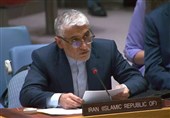NSA Spying on Foreign Embassies Helped US 'Develop' Strategy
TEHRAN (Tasnim) – The National Security Agency in 2010 provided the US ambassador to the United Nations with background information on several governments and their embassies that were undecided on the question of Iranian sanctions.
In May 2010, as the UN Security Council was attempting to win support for sanctions against Iran over its nuclear-energy program, several members were undecided as to how they would vote.
At this point, the US ambassador to the world body, Susan Rice, asked the NSA for assistance in her efforts to “develop a strategy,” leaked NSA documents reveal.
The NSA swung into action, aiming their powerful surveillance apparatus at the personal communications of diplomats from four non-permanent Security Council members — Bosnia, Gabon, Nigeria and Uganda. This gave Rice an apparent upper-hand in the course of the negotiations, RT reported.
In June, 12 of the 15-member Security Council voted in favor of new sanctions.
Later, Rice extended her gratitude to the US spy agency, saying its surveillance had helped her to know when diplomats from the other permanent representatives — China, England, France and Russia — “were telling the truth ... revealed their real position on sanctions ... gave us an upper hand in negotiations ... and provided information on various countries’ ‘red lines’.”
The information comes from a new book by journalist Glenn Greenwald, ‘No Place to Hide: Edward Snowden, the NSA, and the US Surveillance State’, the New York Times reported.
Rice’s request for assistance was discovered in an internal report by the security agency’s Special Source Operations division, which cooperates with US telecommunications companies in the event a request for information is deemed necessary.
Greenwald’s book goes on sale Tuesday.
The book also provides a list of embassies around the world that had been infiltrated by the US spy agency, including those of Brazil, Bulgaria, Colombia, the European Union, France, Georgia, Greece, India, Italy, Japan, Mexico, Slovakia, South Africa, South Korea, Taiwan, Venezuela and Vietnam.
News of the NSA’s vast surveillance network, which targets friends and enemies of the United States with equanimity, were revealed in June when former NSA contractor Edward Snowden provided Greenwald with thousands of files on the program.
Despite promises by President Obama for greater safeguards on the invasive system, which has infuriated people around the world, the NSA seems determined not to let international public opinion block its spying efforts.
“While our intelligence agencies will continue to gather information about the intentions of governments — as opposed to ordinary citizens — around the world, in the same way that the intelligence services of every other nation do, we will not apologize because our services may be more effective,” according to a White House statement.
The latest revelations detailing how the NSA gives American diplomats an unfair advantage raises the question as to how such orders passed legal muster in the first place.
According to the documents, a legal team went to work on May 22 building the case to electronically eavesdrop on diplomats and envoys from Bosnia, Gabon, Nigeria and Uganda whose embassies were apparently not yet covered by the NSA.
A judge from the Foreign Intelligence Surveillance Court approved the request on May 26.
The Obama administration has faced fierce criticism following revelations of the global surveillance program, which was used not simply to identify potential terrorists, but to eavesdrop on the communications of world leaders.
Following revelations that German Chancellor Angela Merkel’s private cell phone communications were being hacked by the NSA, Germany pushed for a ‘no-spy’ agreement with the United States to restore the trust.
The Obama administration, however, rejected the offer.
Now Europe has announced plans to construct a new Internet network that bypasses the United States and the NSA, a move the US Trade Representative labeled “draconian.”






